Answer these simple questions and we will find you the BEST prices
Which type of solar quotes do you need?
It only takes 30 seconds
100% free with no obligation

Get up to 3 quotes by filling in only 1 quick form

Compare quotes and find yourself the best deal

Increase the value of your home by installing a new boiler
- whatcost.co.uk
- Central Heating
- Compare Heating
- Compare Heating Types
- Heat Pump vs Gas Boilers
Heat Pump vs Gas Boilers: Costs, Pros & Cons and More

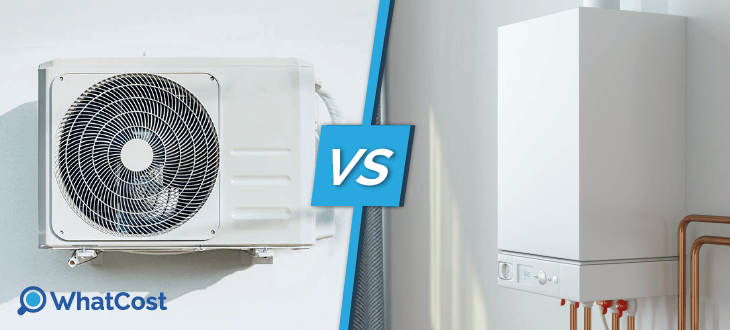
In recent years, heat pumps have emerged as a widespread solution that could transform the way we heat our homes, very much for the better.
But with all we know about heat pumps, how feasible are they really, compared to existing gas boiler-fuelled heating? In this article, we'll explore both of these central heating system types and explain in which cases heat pumps are, or are not, preferable to gas boilers.
One of the main barriers to increasing heat pump uptake in the UK is the installation costs. Therefore, when choosing an installer, we always recommend that you compare quotes from at least 3 heating engineers to find any deals in your area.
If you do this by yourself, you can expect to spend hours of time researching the best options, and even longer waiting before you can finally get some quotes to compare. To save you all this time and effort, leave it to the dedicated team at WhatCost to find you up to 3 of the most suitable boiler installers operating in your local area, based on the details you provide.
All of the installers in our network are individually vetted by us, and you're under no obligation to accept any of the quotes you receive. To get your free, tailored quotes, click the button below.
- Quotes from local installers
- Payment by finance available
- Save up to £975
It only takes 30 seconds

Comparing the cost of a heat pump and a boiler
When it comes to the cost to buy and install a heat pump vs a gas boiler, heat pumps are significantly more expensive. The cost of new boilers tends to fall between £1,500 - £4,000, including installation. This is relatively cheaper even compared to oil boiler prices, and other boiler types. On the other hand, heat pump costs range from £8,000 - £45,000, including installation.
In the table below, we've summarised the total costs you can expect to pay depending on the type of system you choose.
| Heat pumps vs gas boilers: Supply + installation costs | |
|---|---|
| Gas boiler costs | |
| Type of boiler | Cost including installation |
| Combi | £1,500 – £4,500 |
| System | £1,700 – £4,000 |
| Conventional | £1,700 – £4,000 |
| Heat pump costs | |
| Heat pump type | Installation costs |
| Air source | £8,000–£18,000 |
| Ground source | £14,500–£45,000 |
| Water source | £6,000–£11,000 |
These prices are cost estimates based on our extensive market research and are meant as a guide only. For tailored quotes based on your home's specifications, get free quotes from WhatCost.
In both cases, the final price you pay depends on the type of system you install, the size, and the model and manufacturer you choose.
In terms of installation, the installation company, its size, and its location will all influence the price. To learn more about the difference in installation prices, and the process for each type of heating system, skip to Heat pumps vs gas boilers: installation.
To see more in-depth new boiler prices according to the various boiler brands out there, check out our dedicated boiler brand cost pages:
To combat the widely unfeasible upfront heat pump costs, the UK Government has launched the Boiler Upgrade Scheme. This offers a fixed grant of £7,500 to homeowners in England and Wales to help cover some of the installation costs.
| Heat pump costs: Boiler Upgrade Scheme grant | |||
|---|---|---|---|
| Heat pump type | Supply + installation average cost | BUS grant | Supply + installation costs with BUS |
| Air source heat pump | £13,000 | £7,500 | £5,500 |
| Ground source heat pump | £21,000 | £7,500 | £13,500 |
As you can see in the table above, the BUS grant could bring down the cost of a new heat pump so that it's more in line with a new gas boiler. Any remaining costs are to be covered by the homeowner. To see if you're eligible, and to apply for the grant, visit GOV.UK.
When it comes to upfront supply and installation costs, gas boilers are far cheaper to buy and install than a heat pump, especially a ground source heat pump.
However, the Boiler Upgrade Scheme grant of £7,500, that’s nearly 60% of the supply and installation of an air source heat pump, and 35% of the cost of a ground source heat pump.
Therefore, if you choose a £10,000 air source heat pump, the Boiler Upgrade Scheme grant reduces the cost to an average boiler installation of £2,500.
Is a heat pump or a boiler cheaper to run?
Once installed, you can expect more central heating costs to come in. In particular, in the form of annual running costs. On average, you can expect to pay £860 to run a gas boiler, and £965 to run a heat pump per year.
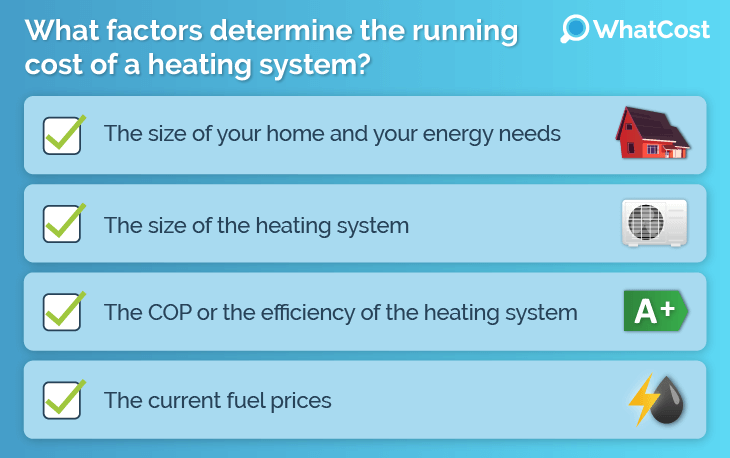
This difference can largely be explained by the current cost of fuel in the UK. Gas currently costs 6.89p/kWh, whereas electricity is currently four times this price, at 27.35p/kWh.
The table below shows the estimated running costs that we have calculated based on the type of heating system and its efficiency.
| Switching to a heat pump from a gas boiler: Annual running costs | |||||
|---|---|---|---|---|---|
| Heat system | Annual average heat demand | Efficiency | Current energy price | Daily standing charge | Annual heating bill |
| Gas boiler | 9,653 kWh | 92% (A-rated) | 6.89p | 29.60p | £830.96 |
| Gas boiler | 9,653 kWh | 85% (D-rated) | 6.89p | 29.60p | £890.47 |
| Heat pump | 9,653 kWh | 400% (COP 4) | 27.35p | 53.35p | £854.75 |
| Heat pump | 9,653 kWh | 300% (COP 3) | 27.35p | 53.35p | £1,074.76 |
The average heating demand was taken from Ofgem's Typical Domestic Consumption Values. This is an average based on a medium-sized house with 2-3 people. Current energy prices are correct as of October 2023.
The table below outlines these differences in these running costs.
| Switching to a heat pump from a gas boiler: Annual savings | |||
|---|---|---|---|
| Average annual running costs | Annual running costs: Lower efficiency | Annual running costs: Higher efficiency | |
| Gas boiler | £860 | £890.47 | £830.96 |
| Heat pump | £965 | £1,074.76 | £854.75 |
| Total savings | -£105 | -£184.29 | -£23.79 |
How did we make these calculations?
ℎ𝑒𝑎𝑡𝑖𝑛𝑔 𝑐𝑜𝑠𝑡𝑠 = ℎ𝑒𝑎𝑡 𝑑𝑒𝑚𝑎𝑛𝑑 𝑥 1 𝑒𝑓𝑓𝑖𝑐𝑖𝑒𝑛𝑐𝑦 𝑜𝑓 ℎ𝑒𝑎𝑡𝑖𝑛𝑔 𝑠𝑦𝑠𝑡𝑒𝑚 𝑥 𝑓𝑢𝑒𝑙 𝑝𝑟𝑖𝑐𝑒 + 𝑔𝑎𝑠 𝑠𝑡𝑎𝑛𝑑𝑖𝑛𝑔 𝑐ℎ𝑎𝑟𝑔𝑒
To calculate this we took the average heating demands as reported by Ofgem's Typical Domestic Consumption Values.
A medium-sized 2-3 bedroom household in the UK typically uses 11,500kWh of gas per year. It's estimated that 2.5% of this is used for cooking purposes, leaving 9,653kWh for heating.
The efficiency of the heating system determines the heating output. Therefore, to find the total running costs we multiplied this figure by the current price for energy with the addition of the current daily standing charge.
In the case of new A-rated gas boilers, which run at 92%, we made the following calculation.
Running costs of a gas boiler (ErP 92%) = 9,653 x (1 ÷ 92) x 0.689 + (0.2960 x 365)
Heat pumps produce 3-4 times the energy per kWh can instead be calculated using the following example:
Running costs of a heat pump (COP 3) = (9,653 ÷ 3) x 0.2735 + (0.5335 x 365)
Do bear in mind that these calculations are based on rough estimates, you're actual running costs will differ depending on your exact circumstances.
Based on these calculations, it seems that gas boilers can save you more money per year in running costs, compared to heat pumps. In this way, they are among the cheapest heating systems currently available.
Depending on the efficiency of the systems you compare, gas boilers can cost you less by £24 – £184.
Heat pumps vs gas boilers: installation
In terms of installation time and complexity, gas boilers are generally more straightforward- taking less time and costing considerably less to install than heat pumps. With that being said, the time it takes to install a heat pump and the scale of the job depends on the type of heat pump you install.
We've broken down the installation process in the table below, according to the type of system you install.
| Heat pumps vs gas boilers: Installation | |||
|---|---|---|---|
| Supply + installation costs | Installation time | Lifespan of heating system | |
| Gas boilers | £1,500 – £4,500 | 1 - 2 days | 10 - 15 years |
| Air source heat pump | £8,000 – £18,000 | 2 - 4 days | 20 - 25 years |
| Ground source heat pump | £14,500 – £45,000 | Up to 1 week | Up to 50 years |
Gas boiler installation
Gas boiler installation typically takes 1 - 2 days. This will depend on the type of replacement and any additional work associated with it.
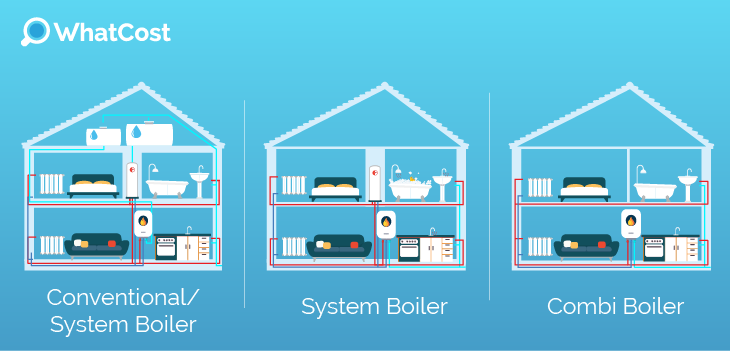
- Drain your heating system
- Removal of old boiler
- Removal of any additional units (hot water cylinder and cold water tank)
- New boiler installation
- Adjust pipework to 22mm diameter (if required)
- New boiler installation
- System power flush
A like-for-like boiler swap can be done in as little time as 4 hours, as long as the area is easily accessible and the pipework and central heating radiators are in good condition. For example, system boiler prices will be lower if you replace a system boiler with a new one rather than one of a different type.
A conventional to combi boiler swap, as another example, will take the longest since this involves the removal of the hot water cylinder and cold water feed tank. You may also need to replace the surrounding pipework to support higher water flow rates. This will impact the new combi boiler price.
The table below shows how the type of boiler swap will affect the installation time.
| Heat pumps vs gas boilers: Installation | |
|---|---|
| Installation service | Installation time |
| Like-for-like boiler swap | 4-6 hours |
| Boiler relocation | 1-2 days |
| Switching the type of boiler | 1-2 days |
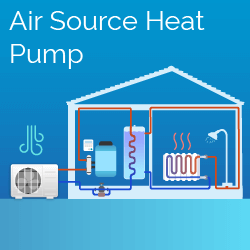
Air source heat pump installation
Air source heat pumps will take some more time to install, with a typical installation lasting 2 - 4 days.
Air source heat pumps can either be installed entirely indoors, which are known as monobloc units, or with an indoor and outdoor unit, known as split units. The latter will usually take longer to install and will be priced higher.
- Indoor units, including a buffer tank, expansion vessel, and hot water cylinder, are installed
- An outdoor unit is installed somewhere around the property with a stable concrete base and good airflow
- A hole is made in the wall to the outside to create an access point for wiring
- A condensate line and refrigerant line are connected to the indoor units
- Central heating radiators, or an underfloor heating system, are installed
- Wiring and electrics are connected
- Sensors, which sends temperature signals to your thermostat, are installed
Ground source heat pump installation
A ground source heat pump installation can take 2 - 4 days to complete, but it will depend on the level of outside excavation work required. For those with adequate outdoor space around their property, the ground source heat pump pipes can be laid horizontally.
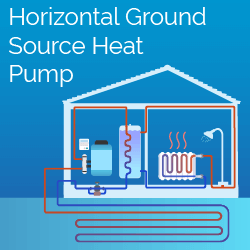
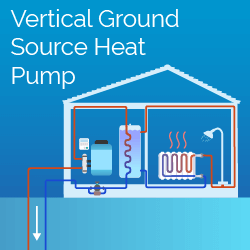
Those with limited space will instead have to lay them vertically. Vertical systems require boreholes are to be dug into the ground which can lead to costs of up to £45,000 and add another 1-2 days to the installation time, or longer depending on the geological conditions.
- Loop fields are excavated into the ground*
- Pipes are installed into the buried loop fields
- The loop fields are filled with a mixture of water and antifreeze solution which act as a heat exchanger
- Heat distribution infrastructure is modified or replaced
- Heat pump is installed and connected to the ductwork and ground loop
* Horizontal systems usually require 600m2 to 1200m2 of clear horizontal space. As a general rule, an 8kW ground source heat pump requires a ground loop of at least 400m2.
Vertical systems require boreholes to be drilled into the ground from 50m to 150m in the ground. The general rule here is that 3 boreholes will be needed for every 10 kW of heating output required for your home.
Usually, installing a gas boiler is fast and simple, there are also many established installers readily available to carry out your installation.
Heat pump installations, however, can take a week or more. Due to lower demand, there are fewer qualified installers for heat pumps, leading to longer wait times.
The scale of the installation process is also much more vast which amounts to longer installation times.
Do you know where to find top boiler installation companies in your area? Comparing quotes from multiple companies helps you find the best deals, but the search can be time-consuming, taking several hours in some cases.
Simplify the process with WhatCost! Our free service connects you with up to 3 local installers, allowing you to easily compare tailored quotes and make an informed choice that saves you money. Click below to get started. It's completely free and you're under no obligation to accept any quotes received.
- Quotes from local installers
- Payment by finance available
- Save up to £975
It only takes 30 seconds

Which has the best performance, a heat pump or a boiler?
When assessing the performance of gas boilers vs heat pumps, we can compare various factors that indicate their suitability for different home heating needs.
Flow temperature
A-rated gas boilers can provide a rapid, high, and consistent heat output, reaching around 70°C. Whereas, heat pumps deliver lower output temperatures. For radiators, it sits between 35°C to 45°C, and around 60°C for hot water.
Therefore, you may have to upgrade to larger radiators as heat pumps need a larger surface area to omit the same heat output.
Home suitability
Gas boilers, with their consistent 70°C output, remain optimal for daily home applications.
Older homes may also need to be insulated to optimise the performance of your new heat pump so that it can deliver the equivalent amount of heat. This might include double glazing your windows or insulating your floors, walls, and roof.
While both heating systems can deliver consistent levels of heating and hot water comfort, gas boilers excel in daily applications with a consistent 70°C output.
Heat pumps, with lower temperatures, may require radiator upgrades and home insulation improvements to ensure optimal performance.
Is a boiler or heat pump more efficient?
The efficiency of your heating system can make a considerable difference in your annual running costs. Gas boilers come with an Energy-related Product (ErP) rating of 92% or higher, the minimum standard set out by ErP Regulations.
Heat pump efficiency is classified by its Coefficient of Performance, or CoP, which measures the ratio of electricity produced by the heat pump to the energy it consumes. Generally, air source heat pumps come with a CoP of 3, whereas ground source heat pumps tend to come with a CoP of 4.
Therefore, for every 1kWh of electricity consumed by the heat pump, 3kWh of heat is produced. This makes them highly energy efficient, surpassing a new gas boiler by over 200%.
While a new boiler, with modern condensing technology, will improve the efficiency of your heating system, it is far less efficient compared to a new heat pump. What’s more, heat pumps extract energy from renewable energy sources, such as the air or the ground. This makes them far better for the environment, compared to fossil-fuelled gas boilers.
Is a heat pump an option for my household?
A new heat pump can work well in almost any type of home, as long as its energy efficiency is up to par. The more efficient your home, the better and more cost-effective the heat pump will be.
Heat pumps are easily the most energy-efficient type of heating system available in the UK. As the industry continues to grow, and the installer workforce expands, we can only expect installation costs to reduce. In the meantime, be sure to apply for a grant through the government's Boiler Upgrade Scheme.
With all that being said, considering several other points of comparison, as we've detailed throughout this article, gas boilers currently seem to out perform heat pumps. Perhaps most importantly, they remain significantly cheaper to buy, to install, and to run.
Whichever heating system you choose as the best for your household, you should shop around for local quotes to get a good deal on installation. Finding a qualified boiler installer nearby could take you several hours of research. This is where WhatCost can step in to take this unnecessary hassle off your hands.
Simply fill in our quick 30-second quotes form, and then we'll use your details to find the most suitable heating engineers for your boiler installation. You can then compare their tailored quotes and choose the one that offers the best deal, with the added peace of mind that you're selecting between the most reputable, pre-vetted, and qualified options.
Our service is 100% free and you are under no obligation to accept any of the quotes you receive.
- Quotes from local installers
- Payment by finance available
- Save up to £975
It only takes 30 seconds

Frequently asked questions
Heat pumps tend to cost more to run than a standard gas boiler. Despite the high levels of efficiency associated with heat pumps, the price of electricity is currently 4 times that of gas per kilowatt-hour.
Yes, it is worth it to install a heat pump in place of a gas boiler given it is very energy efficient, producing 3-4 times the energy per kilowatt that it consumes. It also transfers energy from renewable sources, making it far better for the environment and a future-proof heating solution.
Yes, heat pumps are over 200% more efficient than a new gas boiler. Heat pumps tend to come with a CoP of 3 or 4, meaning that they will produce 3-4 times the energy for every kilowatt of electricity that they consume.
Heat pump prices range from £8,000 – £45,000, depending on the type of heat pump you install and the scale of the installation project.

Ciaran is a content writer at WhatCost. He has become an expert in energy saving and eco-conscious living which he uses to create informative content for WhatCost readers.
